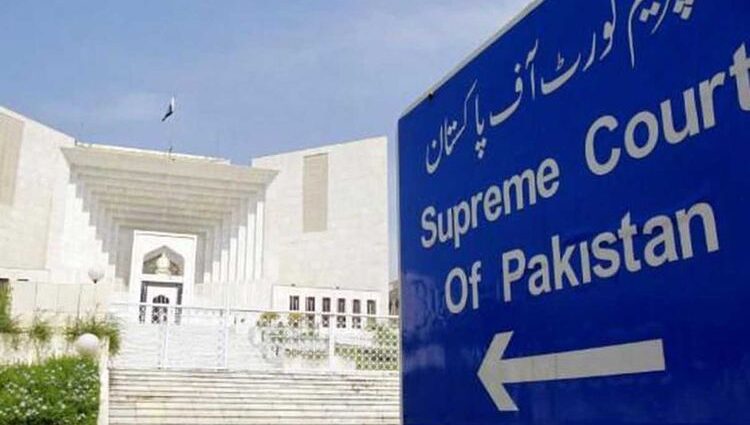CJP Umar Ata Bandial forms five-member learger bench to hear presidential reference, SCBA petition
ISLAMABAD ( Web News )
Chief Justice of Pakistan Justice Umar Ata Bandial formed on Tuesday a five-member larger bench – selecting a judge from each province – to hear the presidential reference filed by the federal government seeking an opinion on Article 63(A) as well as a petition filed by the Supreme Court Bar Association (SCBA) regarding the SC’s insurance of law and order ahead of the no-confidence vote.
The bench is headed by CJP Justice Umar Ata Bandial and comprising Justice Ijazul Ahsan, Justice Mazhar Alam Khan Miankhel, Justice Munib Akhtar and Justice Jamal Khan Mandokhail.
The five-member larger bench will hear the presidential reference and SCBA petition tomorrow (Thursday). Supreme Court Bar Association of Pakistan through its President has made Federation of Pakistan through Secretary, Ministry of Interior, Islamabad and others party in the case. Meanwhile President Dr. Arif Alvi has filed, Reference by under Article 186 of the Constitution of the Islamic Republic of Pakistan, 1973 v. The larger bench will conduct hearing at 1:00 PM tomorrow (Thursday). Notices have been issued to Attorney General for Pakistan Barrister Khalid Jawed Khan, counsels of the political parties, SCBA counsel and other concerned officials.
According to the written order of the apex court’s hearing held on Monday, the SCBA’s counsel, as well as the opposition parties’ counsel, expressed “strong reservations and concerns” that the National Assembly Speaker summoned the NA session for the no-confidence motion on March 25, which was beyond the stipulated 14 days period.
However, the court maintained that it was not “not inclined to take up this matter as it is collateral to the questions of constitutional interpretation raised before the Court”, including the reference filed by President Dr. Arif Alvi
It furthered that for such matters the Constitution “envisages a remedy before Parliament itself”.
The Attorney General of Pakistan made a “categorical statement” before the Court that the federal government would not “hinder or obstruct, or interfere with” any members of the NA (including those of PTI) who wish to attend the no-confidence motion session, and to participate in, and cast their votes, on the resolution.
Regarding the “grave concerns” expressed about political rallies in Islamabad and the influx of supporters into the federal capital and especially in the Red Zone, the AGP suggested that representatives of the political parties sit with Islamabad’s administration and work out a mechanism to the holding of rallies, as well as their days and venues. The apex court dubbed this a reasonable and practical suggestion.
The written order stated that counsel for various political parties accepted the suggestion, but highlighted that the counsel for PPP, PML-N and JUI-F have expressed reservations as to “whether any fruitful outcome will be achieved”.
However, the order said that the counsel maintained that “good faith effort” would be made by all.
The SC directed the AGP to coordinate with the political parties’ counsel to arrange the meetings with the administration on an urgent basis as suggested by him.
The court stated that the Inspector General of Police Islamabad had filed a report in relation to the incident at the Sindh House – wherein PTI workers stormed the House which housed dissident PTI lawmakers.
The SC was also apprised of the strict measures being taken to avoid any repetition of the incident anywhere in the Red Zone in relation to the moving and voting upon of the no-confidence motion.
“The IG states that the FIR already registered will be vigorously pursued in accordance with law,” the order said, adding that the Advocate General Sindh desired for the province’s version to be put on record.
The AG Islamabad assured the court that any representation made by Sindh through the AG would be dealt with in accordance with the law.
The court stated that the concerns expressed by Advocate General Sindh “must be addressed and action taken in accordance with law”.
The order stated that the court was cognizant that the matter was time-constrained and directed all counsel to file concise statements of their submissions by or before March 24, so that the oral hearing could be “completed within an acceptable timeframe”.

